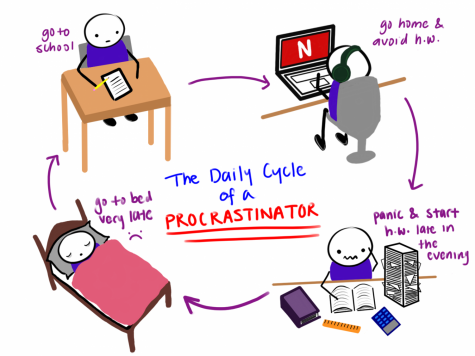Why it’s impossible to stop procrastinating
We don’t procrastinate because of laziness but because of our emotional state
March 31, 2019
After an exhausting day at school, we collapse onto our beds but we can’t help but dread unzipping our backpacks to take out our unfinished homework assignments — so we resort to rolling to the other side of the bed with phone in hand, scrolling through social media, laughing at YouTube videos and texting friends. “Just one more episode,” we tell ourselves, but before we know it, it’s already late into the evening and sudden panic hits. We haven’t done a single math problem or read any of our assigned reading.
The thought of doing something we don’t want to, like our homework, makes us feel miserable. And while we procrastinate on these assignments, the amount of anxiety we have continues to compound. Sometimes, we convince ourselves that the things we’re doing are productive, like spontaneously deciding to give our room a makeover and completely cleaning out our closets.
We are satisfied in the moment while spending hours putting off our homework, but at the end of the day, we know what we’re doing will ultimately result in us suffering the consequences of rushed assignments, a lack of understanding of material and less sleep. Or in short — self-harm.
At first, this may seem like a stretch, but we don’t procrastinate simply because we’re lazy. We all procrastinate, but we are still hard-workers. We procrastinate because of the attitude we have directly towards the task. We may not want to start an assignment because it’s too hard and we doubt our own abilities. We are afraid of confronting it and ignore it for as long as we can, even though the anxiety of needing to complete it lies in the back of our minds.
 Procrastination portrays a lack of self-awareness. When we are taking the test we procrastinated studying for, we promise ourselves we’ll review material earlier for the next test. But we don’t. And that’s because procrastination has become a behavioral pattern — since we find immediate satisfaction, we are bound to repeat the process. This is exactly why procrastination is considered self-harm.
Procrastination portrays a lack of self-awareness. When we are taking the test we procrastinated studying for, we promise ourselves we’ll review material earlier for the next test. But we don’t. And that’s because procrastination has become a behavioral pattern — since we find immediate satisfaction, we are bound to repeat the process. This is exactly why procrastination is considered self-harm.
Contrary to our parents’ lectures about how we don’t manage our time well, we shouldn’t treat procrastination as a product of laziness. Instead, we need to acknowledge the relationship between procrastination and our mental health. We have a constant desire to feel good in the moment, but we have to sacrifice this mentality a little bit and put procrastination into perspective.
We have hours worth of homework to do, but when we come home, we spend hours doing everything but that. And during our hour-long sessions of procrastination, we still feel antsy. When we sit ourselves down and finally do our assignments because we realize we need to sleep soon, we may hate it, but after we’re done, we feel relief because we finally finished. The biggest flaw is that we are knowingly spending more time stressed out about our assignments than actually doing them.
Again, laziness isn’t the problem. We are allowing ourselves to feel terrible. We force ourselves to spend hours of our day channeling negative energy so beating procrastination isn’t an overnight process. It isn’t as simple as promising ourselves to do better in the future in the midst of taking a test we only studied for the previous night.
Because of this, we should find ways to use procrastination to help us instead — procrastination can be beneficial if we teach ourselves to limit how much time we spend doing it. Through active procrastination, being able to decide what tasks should be prioritized and what tasks can be put off for later, we can take the time to seriously reflect on ourselves and the choices we make. Furthermore, we can maximize productivity through procrastinating by allowing our minds to wander, which can hone our creativity for the group project we still need to work on.
But when we spend hours wasting time, we need to realize that we are irrationally ruining our own emotional health as well as putting our grades in jeopardy. When we pick up our phone instead of starting a difficult assignment, recognize that we will be much more content with ourselves and our quality of work if we do the assignment first and reach for the phone second.
And it’s okay to take it slow and gradually increase the number of assignments to finish right after school while decreasing the amount of time we spend doing other things. By doing this, we are setting ourselves up for a more positive emotional state as well as our future-selves thanking us for making the smarter decision.

















